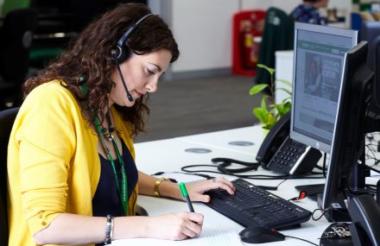When I left our office in Vauxhall’s ‘charity towers’ in March 2020, I never dreamt that it would be over a year until I returned – or to such a different world and working environment.
The pandemic unexpectedly forced us into a working-from-home experiment which has challenged us to think about how we work as an organisation in future.
Despite the challenges, it was inspiring to see how we adapted to new ways of working, with almost 1,400 colleagues moving to remote working within mere days. This included 250 Macmillan Support Line staff who did whatever it took to continue answering calls and providing support to people living with cancer, especially as they faced a whole new world of worries and challenges to their treatment and care.
New ways of working
As the year went on, and many of our staff told us how beneficial they found working from home, the pandemic allowed us to think differently about what a return to the office might look like and how we can embed greater flexibility for all in the long-term.
The success of virtual events also inspired us to see how this new way of working could actually help bring the organisation together.
Our first ever virtual conference in March 2021 was attended by over 1,300 colleagues, with over 60 speakers and contributors offering real time and on demand content, something we could never have achieved in person.
Flexibility
Like many other charities, we had existing informal and formal flexible working practices in place, such as condensed hours, part time contracts and job shares, which I am grateful to have benefited from in my career. We were also able to learn from over 500 employees who worked from home or in the community prior to the pandemic.
However, it became clear that making flexible working the rule rather than the exception will be a big step forward in our journey to make us a truly inclusive employer, improve wellbeing and enhance productivity and engagement across the organisation.
Not only will these new ways of working be vital to empower employees, but it will also enable us to become a more attractive employer for individuals from across the country, and will help us access greater diversity of experience and skills to better represent, understand and support people living with cancer.
98% office staff suggested changes
We created ‘The Where and How We Work’ project board and a ‘Future ways of working’ workstream, including representatives from across the organisation, to develop a vision for flexible working at Macmillan and a set of guiding principles to put it into practice.
Our planning approach was heavily influenced by staff insight and revealed preferred ways of working across teams.
For example, while 57% of colleagues are happy with their current working patterns, a combination of office and homeworking is preferable. 98% of office-based colleagues said they didn’t want to return to the office five days a week.
With all this considered, we distilled our vision down to: Helping our colleagues be at their best every day, striving to be flexible and to promote a better work life balance so we can do whatever it takes for people living with cancer.
In practice, this has led us to an updated flexible working offer where office-based colleagues can move to a combination of home and office-based working, more flexible start and finish times, and improving the consistency of requests for condensed hours.
Piloted returns
Of course, implementing flexible office and home working is still temporarily on hold as we continue to follow government guidance which encourages people to work from home where they can.
However, we know for some people the prolonged period of working from home is increasingly challenging, so we’ve piloted the limited opening of our Glasgow, London and Shipley offices.
This has been facilitated by an online desk booking system and measures in place to reduce the risk of contracting or spreading Covid, including increased office deep cleans, one-way systems, hand sanitisation stations and socially distanced desks.
The safety of our staff is paramount.
Planning for June
When our office doors do officially reopen – planned for 21 June – our conversations about ways of working will be ongoing.
We recognise that some areas, including strategy, collaboration, innovation and onboarding, can be a challenge to do well remotely, and we plan constantly to test and learn how to do this best going forwards.
As we have done throughout the pandemic, communication throughout the organisation will be key – whether it’s all staff webinars or line management conversations – and equality impact assessments will ensure we’re delivering our flexible working vision in the best way for every member of staff.
Many organisations in the charity sector and their staff will have faced the toughest times in their existence as a result of the Covid-19 pandemic.
Taking this time to reflect on how to provide the best ways of working for our teams in future is a vital to ensure we can take on the challenges we’re faced with in the months and years ahead.
Lynda Thomas is chief executive of Macmillan
Related news











